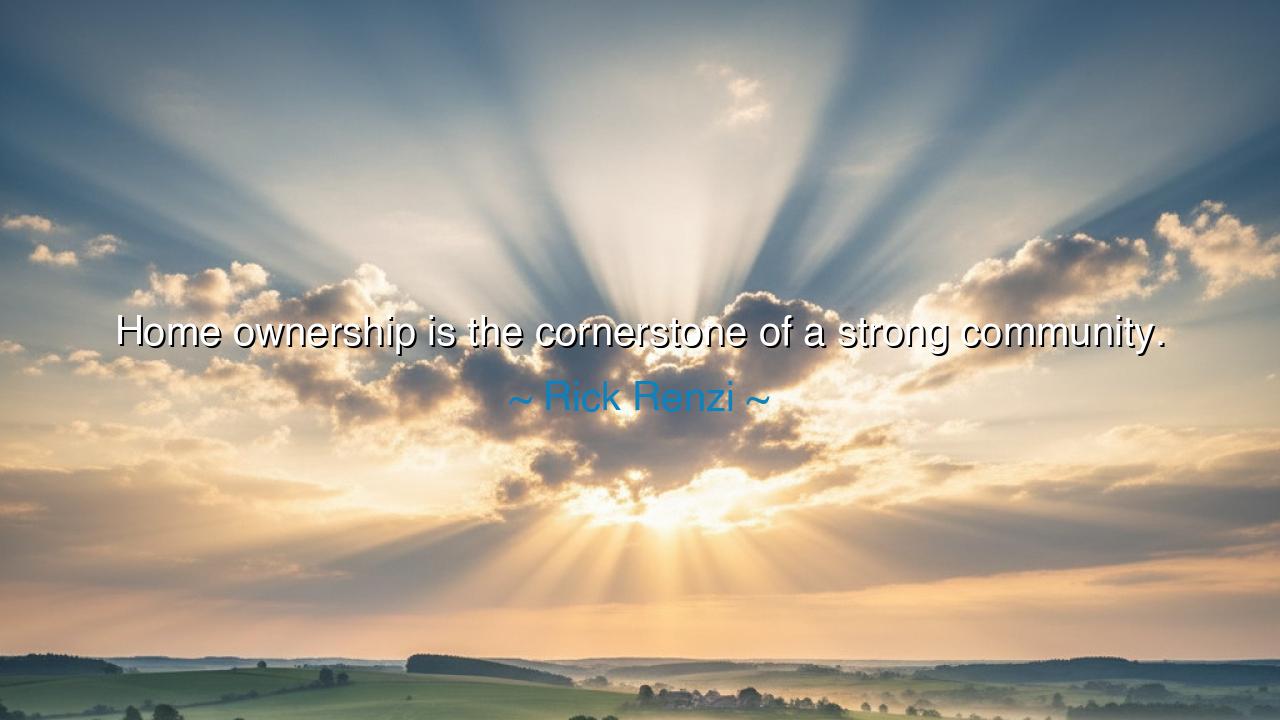
Home ownership is the cornerstone of a strong community.






The words of Rick Renzi — “Home ownership is the cornerstone of a strong community.” — speak with the calm authority of a truth known since the dawn of civilization. In these few words, we hear the ancient rhythm of belonging, of stewardship, of human connection to the land and to one another. The home, he reminds us, is more than walls and roof — it is the foundation of identity, the seed from which a community takes root. To possess a home is not merely to own property, but to claim one’s place in the world, to stand upon solid ground and say, “Here I belong. Here I will build, and here I will care.”
In the days of old, when the first cities were carved from the wilderness, humanity learned that stability begins with shelter. A home was not simply a dwelling but a promise — a covenant between person and place. Around each home, gardens were planted, fires tended, and families raised. The collective strength of these hearths gave rise to the first communities, bound not by law or force, but by shared care and mutual protection. Renzi’s words call us back to that timeless wisdom: that the ownership of one’s home cultivates responsibility, pride, and peace — the pillars upon which all societies must stand.
The ancients built their empires upon this principle. Consider the Roman Republic, which offered land and small homes to its veterans — not as a reward for service alone, but as a safeguard for the state. They knew that a man who owns his home will defend it, nurture it, and in doing so, protect the community around it. When the farmer tended his field, when the mother swept her threshold, they were not acting alone; they were weaving threads into the great fabric of the nation. Thus, the Roman countryside, filled with humble estates and steadfast citizens, became the heart of Rome’s enduring strength. So it is in every age: the rooted citizen is the shield of the realm.
But Renzi’s wisdom also holds warning. In a world of impermanence — of fleeting rents, wandering labor, and uprooted lives — the cornerstone of community begins to crack. When people have no place to call their own, the bond of belonging weakens. They cease to invest in the soil beneath them or in the faces around them. The streets grow transient; the spirit of neighborly care fades. For without ownership, there can be no deep stewardship, and without stewardship, no lasting peace. The ancients knew this truth well: the man who tends no home tends no future.
Yet, the power of home ownership lies not only in property, but in participation. To own a home is to partake in the destiny of a place. It calls one to plant trees whose shade may bless future generations, to mend fences not merely for oneself but for those who live nearby. It is through this daily act of care — fixing, planting, improving — that the heart of a community beats strong. When one home shines, the street glows; when one garden flourishes, the air of the neighborhood sweetens. Home ownership thus becomes not a privilege alone, but a duty of honor — the shared labor of love that binds people into one body.
We see this truth reflected in modern times as well. After the Second World War, nations rebuilt not merely with steel and cement, but with hope — granting homes to families who had endured loss. In the United States, the GI Bill helped millions of soldiers become homeowners, transforming empty fields into vibrant suburbs. Those neighborhoods, filled with laughter and hard work, became the heartbeat of postwar renewal. Where once there had been rubble, there arose gardens, schools, and friendships. It was not wealth alone that strengthened the land, but the spirit of ownership, the sense that one’s effort mattered, that one’s home was a gift to the future.
The lesson of Renzi’s words, then, is both ancient and urgent: a society that wishes to endure must root its people in the soil of belonging. Let each man and woman strive to build, however humbly — not only a house, but a home that reflects care, dignity, and love. For those who cannot yet own, let them treat the place they dwell as sacred ground, worthy of respect. Let us all remember that a home well-kept is a message to the world: “I am part of this. I will nurture it.” When many hearts share this vow, a community becomes unbreakable.
So, build not only with hands, but with heart. Plant trees before your door. Know your neighbors’ names. Guard the peace of your street as you would your hearth. For it is written in every age and every tongue: the home is the cornerstone, and the people who cherish it are the walls that hold the world together.






AAdministratorAdministrator
Welcome, honored guests. Please leave a comment, we will respond soon